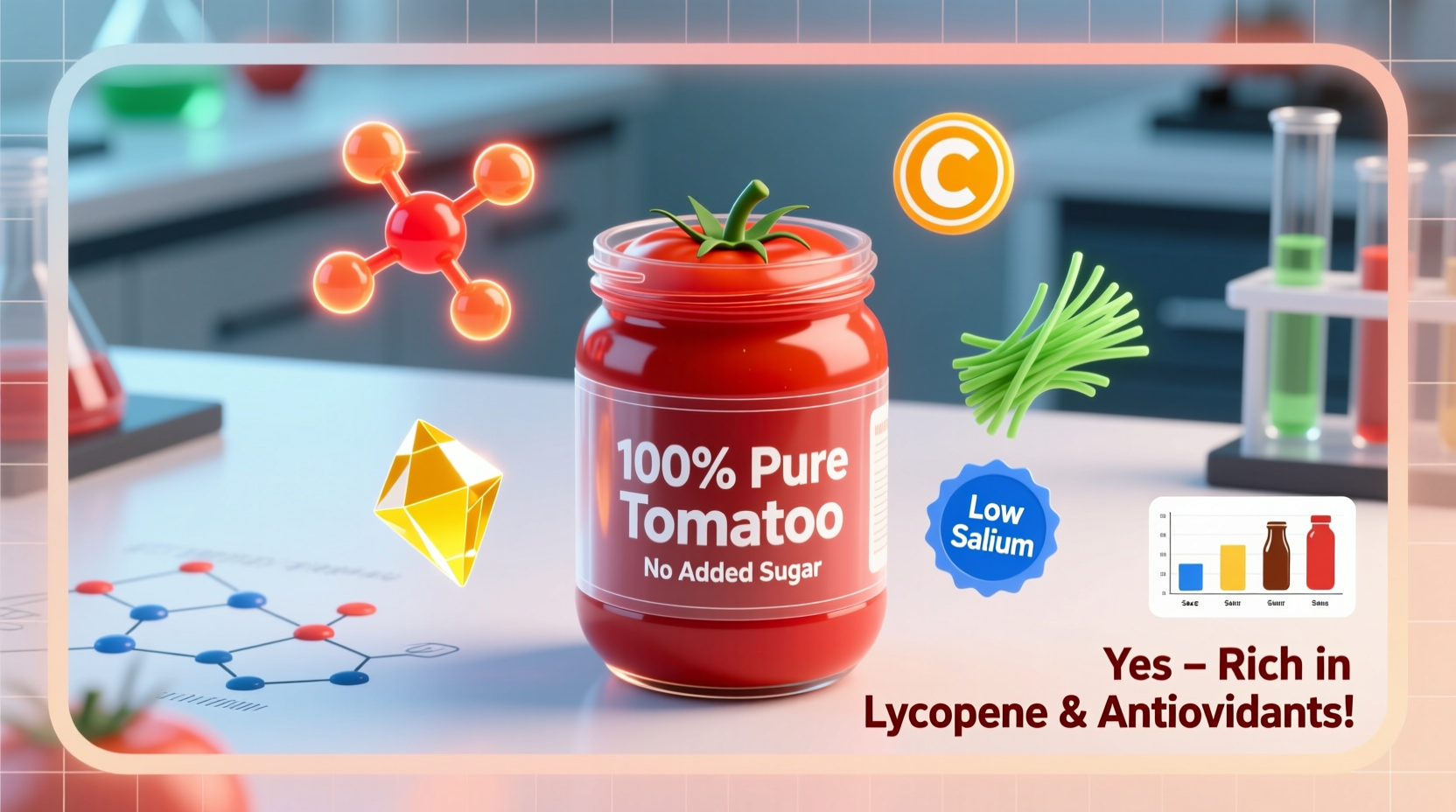Discover exactly how healthy tomato sauce really is, what makes certain varieties better than others, and practical ways to incorporate this kitchen staple into your diet for optimal health benefits. This evidence-based guide cuts through marketing claims to deliver the facts you need to make informed choices.
What Exactly Is Tomato Sauce?
Before evaluating its health properties, it's important to understand what distinguishes tomato sauce from similar products. Unlike tomato paste (which is highly concentrated) or tomato puree (which sits between sauce and paste in consistency), traditional tomato sauce contains additional ingredients like herbs, spices, and sometimes sweeteners or thickeners.
According to the USDA FoodData Central database, a standard 1/2 cup (120g) serving of regular tomato sauce typically contains:
| Nutrient | Amount per 1/2 Cup | % Daily Value |
|---|---|---|
| Calories | 70 | 3% |
| Total Fat | 0.5g | 1% |
| Sodium | 480mg | 21% |
| Total Carbohydrates | 15g | 5% |
| Sugars | 10g | * |
| Fiber | 3g | 11% |
| Vitamin C | 15mg | 17% |
| Vitamin A | 20% DV | 20% |
| Lycopene | 15-20mg | * |
*Percent Daily Values based on a 2,000 calorie diet. Lycopene has no established daily value.
The Surprising Health Benefits of Tomato Sauce
Tomato sauce isn't just a pizza topping—it's a nutritional powerhouse when prepared properly. Research published in the American Journal of Clinical Nutrition reveals that processed tomato products like sauce actually deliver more bioavailable lycopene than raw tomatoes.

Enhanced Lycopene Absorption
Lycopene, the red pigment in tomatoes, is a potent antioxidant with impressive health benefits. What many people don't realize is that cooking tomatoes with a small amount of healthy fat significantly increases lycopene absorption. A study from Ohio State University found that lycopene absorption from tomato sauce was up to 4 times greater than from raw tomatoes.
Heart Health Protection
Regular consumption of tomato-based products has been linked to improved cardiovascular health. Research in the British Journal of Nutrition demonstrated that participants who consumed tomato sauce daily for two weeks experienced significant reductions in LDL ("bad") cholesterol and blood pressure levels.
Cancer Risk Reduction
Multiple studies, including research published in Cancer Epidemiology, Biomarkers & Prevention, have found associations between high tomato product consumption and reduced risk of prostate, lung, and stomach cancers. The combination of lycopene, vitamin C, and other phytochemicals appears to work synergistically for protective effects.
Potential Health Concerns to Watch For
While tomato sauce has impressive health credentials, certain varieties can undermine its nutritional value. Understanding these potential pitfalls helps you make smarter choices.
Sodium Content: The Hidden Culprit
Many commercial tomato sauces contain alarmingly high sodium levels. The American Heart Association recommends no more than 2,300mg of sodium daily, with an ideal limit of 1,500mg for most adults. A single serving of some popular brands can contain up to 500mg of sodium—nearly one-third of the ideal daily limit.
Sugar Additions
Check labels carefully, as many brands add significant sugar to balance acidity. Some varieties contain up to 12 grams of sugar per serving—equivalent to three teaspoons. For those managing diabetes or watching sugar intake, this can be problematic.
BPA in Canned Products
The U.S. Food and Drug Administration acknowledges concerns about bisphenol A (BPA) leaching from can linings into acidic foods like tomato sauce. While many manufacturers have moved to BPA-free linings, it's worth checking packaging or opting for glass containers when possible.
Choosing the Healthiest Tomato Sauce
Not all tomato sauces are created equal. Follow these evidence-based guidelines to select the most nutritious options:
Reading Labels Like a Pro
When shopping for tomato sauce, look for these key indicators of quality:
- Sodium content under 200mg per serving
- No added sugars or sweeteners
- Short ingredient list with recognizable components
- Organic certification to avoid pesticides
- BPA-free packaging when purchasing canned varieties
Homemade vs. Store-Bought: The Nutritional Reality
While homemade sauce generally offers the healthiest option, a study from the University of California found that properly prepared store-bought sauces can still deliver substantial nutritional benefits. The key difference lies in sodium and additive content.
Simple Homemade Tomato Sauce Recipe
Creating your own sauce ensures maximum health benefits while minimizing unwanted additives:
- Sauté 1 chopped onion and 3 minced garlic cloves in 1 tbsp olive oil
- Add 2 (28-ounce) cans of whole peeled tomatoes (preferably organic)
- Include 1 tsp dried oregano, 1 tsp dried basil, and a pinch of red pepper flakes
- Simmer uncovered for 30-40 minutes until thickened
- Season with salt to taste (or omit for lower sodium)
- Store in glass containers for up to 5 days
Maximizing Health Benefits When Using Tomato Sauce
To get the most nutritional value from tomato sauce, consider these evidence-based preparation tips:
The Fat Factor
Since lycopene is fat-soluble, adding a small amount of healthy fat significantly boosts absorption. Research in the Journal of Nutrition shows that consuming tomato sauce with just 5 grams of olive oil increases lycopene absorption by 60% compared to fat-free preparations.
Cooking Time Matters
Contrary to what many believe, longer cooking times (within reason) actually increase lycopene availability. A study published in Food Chemistry found that lycopene content increased by up to 35% after 30 minutes of cooking compared to raw tomatoes.
Acidity Balance
The natural acidity of tomatoes helps preserve nutrients during cooking. However, adding baking soda to reduce acidity (a common practice) can destroy valuable vitamin C. Instead, balance acidity with natural sweeteners like grated carrots or a small amount of onion.
Special Dietary Considerations
Tomato sauce can fit into various dietary patterns with some modifications:
For Heart Health
Choose low-sodium varieties and pair with lean proteins and whole grains. The American Heart Association recommends incorporating tomato-based dishes at least twice weekly as part of a heart-healthy eating pattern.
For Diabetes Management
Monitor portion sizes and select no-sugar-added varieties. The fiber content in tomato sauce (about 3g per serving) helps moderate blood sugar response when consumed as part of a balanced meal.
For Digestive Sensitivity
Some individuals with acid reflux or IBS may need to limit tomato products. If you experience discomfort, try removing seeds and skins before cooking, as these contain higher concentrations of compounds that may trigger symptoms.











 浙公网安备
33010002000092号
浙公网安备
33010002000092号 浙B2-20120091-4
浙B2-20120091-4